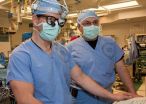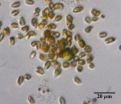(Press-News.org) January 19, 2013 – New Orleans – We all know that getting a good night's sleep is good for our general health and well-being. But new research is highlighting a more surprising benefit of good sleep: more feelings of gratitude for relationships.
"A plethora of research highlights the importance of getting a good night's sleep for physical and psychological well-being, yet in our society, people still seem to take pride in needing, and getting, little sleep," says Amie Gordon of the University of California, Berkeley. "And in the past, research has shown that gratitude promotes good sleep, but our research looks at the link in the other direction and, to our knowledge, is the first to show that everyday experiences of poor sleep are negatively associated with gratitude toward others – an important emotion that helps form and maintain close social bonds."
Social psychologists are increasingly finding that "prosocial" behavior – including expressing gratitude and giving to others – is key to our psychological well-being. Even how we choose to spend our money on purchases affects our health and happiness. And children develop specific ways to help others from a very young age. Gordon and other researchers will be presenting some of these latest findings at the Society for Personality and Social Psychology (SPSP) annual meeting today in New Orleans.
Sleeping to feel grateful
A large body of research has documented that people who experience gratitude are happier and healthier. In three new studies, Gordon and Serena Chen, also of the the University of California, Berkeley, explored how poor sleep affects people's feelings of gratitude.
In the first study, people who experienced a poor night's sleep were less grateful after listing five things in life for which they were appreciative than were people who had slept well the night before. The researchers adapted the Pittsburgh Sleep Quality Index, which measures sleep quality and number of hours slept, among other variables, to evaluate the previous night's sleep.
In the second study, participants recorded their sleep from the previous night for two weeks and their feelings of gratitude. The researchers found a decline in gratitude associated with poor sleep, and those participants reported feeling more selfish those days.
The final study looked at heterosexual couples and found that people tend to feel less grateful toward their romantic partners if either they or their partners generally sleep poorly. "In line with this finding, people reported feeling less appreciated by their partners if they or their partner tends to sleep poorly, suggesting that the lack of gratitude is transmitted to the partner," Gordon says.
"Poor sleep is not just experienced in isolation," Gordon says. "Instead, it influences our interactions with others, such as our ability to be grateful, a vital social emotion."
Giving away money to feel wealthy
Just as expressing gratitude confers benefits, so too does giving to others. New research shows that people all around the world – from Canada to Uganda, from South Africa to India – derive more happiness from spending money on others than they do on themselves.
"For the first time, we show that giving away money or spending it on others confers the ironic psychological benefit of increasing the giver's sense of wealth," says Michael Norton of Harvard Business School and co-author with Elizabeth Dunn of the University of British Columbia of the upcoming book Happy Money: The Science of Smarter Spending. In a suite of new, not-yet published, studies, Norton and colleagues showed that charitable giving makes people feel wealthier.
This research follows on other recent work published in Psychological Science by Norton and colleagues that shows that giving time to others – from helping with homework to shoveling a neighbors' driveway – actually makes people feel that they have more time. "In fact, giving time away alleviates people's sense of time famine even more than receiving unexpected windfalls of free time."
That people feel wealthier from spending money on others may explain why poor individuals tend to give away a higher fraction of their income than members of the middle class do. In one study, researchers reported that Americans earning less than $20,000 a year give a higher percentage of their income to charity than others earning up to $300,000 a year.
"Our results suggest when the poor give money away, that very act might mitigate their feelings of poverty," Norton says. "More broadly than this specific benefit, our investigation contributes to the growing body of research documenting the benefits of prosocial behavior, which include greater happiness, reduced mortality, and better immune function."
Buying experiences to feel happy
In related research, psychologists are finding that spending money on experiential purchases, such as vacations, concerts, and meals out, tends to bring us more happiness than material purchases, such as clothing, jewelry, or electronic gadgets. Amit Kumar and Thomas Gilovich of Cornell University are investigating one potential explanation for this difference: that experiences prompt storytelling more than possessions do.
In new research, they asked participants to recall either a significant experiential purchase or a significant material purchase. They then asked them how much they had talked about the purchase they recalled, and questions related to the satisfaction they derived from their purchase. Participants rated a higher satisfaction for experiences than for possessions, which was because they were more likely to talk about the experiences with other people.
In another experiment, the researchers measured what happens when people cannot talk about their purchases. They asked participants if they would be willing to pay a price to be able to talk about a beach vacation (experiential purchase) or an electronic good (material purchase). "Participants were more likely to switch from a better purchase that they could not talk about to a lesser purchase that they could talk about in the experiential condition than in the material one," Kumar says.
"Well-being is likely to be enhanced by shifting the balance of spending in our consumer society away from material goods and towards experiential ones," Kumar says. "This research also suggests that there are benefits to be had not only by nudging people to choose experiences over possessions, but also by encouraging people to share stories about their experiences."
Knowing what is best to help others
The roots for how we give to others form at a very young age. Children, it turns out, are very sophisticated givers – not only coming to someone's aid when needed but also coming up with the best strategy for doing so, often independent of an adult's instruction.
In new research, Kristina Olson of Yale University and Alia Martin have found that children often will act, thinking they know better than others what is best for them or others. In a series of experiments, the researchers investigate whether 3-year-old children will help someone by ignoring the specific request and instead offering a better alternative.
In one study, for example, when an experimenter asks the child for a specific marker, but the child knows that marker does not work, the child will instead offer up a better marker. In another study, a pre-recorded child asks the child participant to give her a piece of chocolate via a tube that supposedly connects them. If the participant knows that chocolate makes the other child sick, the participant will decide to give her fruit snacks instead.
"Perhaps most provocatively, children will selectively decide not to help in this way if they don't like the person," Olson says. "For example, if an experimenter has previously been mean, children won't warn the adult of a potential harm – such as something sharp in the container they are reaching in – but will if the experimenter was not mean."
"These results suggest that children are able to help adults and peers already by the preschool years in rather complex ways, even when the beneficiary is misguided about what he or she wants," Olson says. "Children don't just blindly do as they are requested, but rather consider a person's goal and consider alternative possible ways to achieve that goal."
###
A press conference on this research "Giving, Getting, and Gratitude" took place Jan. 19, 2013, at the SPSP annual meeting. More than 3,600 scientists are in attendance at the meeting in New Orleans from Jan. 17-19.
SPSP promotes scientific research that explores how people think, behave, feel, and interact. The Society is the largest organization of social and personality psychologists in the world.
Surprising connections between our well-being and giving, getting, and gratitude
2013-01-19
ELSE PRESS RELEASES FROM THIS DATE:
When mom is the CEO at home, workplace ambitions take a back seat
2013-01-19
It's often said that women can have it all – motherhood and a successful career. But a new study from the University of California, Berkeley, suggests that women who rule the household have less energy for or interest in being a rising star in the workplace.
While household decision-making power was highly valued by both men and women who participated in the UC Berkeley study, women reported that running the home made them less likely to pursue promotions and other career advancement steps at the office. This was not the case for men, whose work goals were unchanged by ...
Charting new routes for women at work: Looking to the home and classroom
2013-01-19
January 18, 2013 – New Orleans – When mom is the boss at home, she may have a harder time being the boss at work. New research suggests that women, but not men, become less interested in pursuing workplace power when they view that they are in control of decision-making in the home. This shift in thinking affects career choices without women even being aware.
"Women don't know that they are backing off from workplace power because of how they are thinking about their role at home," says Melissa Williams of Emory University. "As a result, women may make decisions such ...
Study provides new insights on drought predictions in East Africa
2013-01-19
With more than 40 million people living under exceptional drought conditions in East Africa, the ability to make accurate predictions of drought has never been more important. In the aftermath of widespread famine and a humanitarian crisis caused by the 2010-2011 drought in the Horn of Africa—possibly the worst drought in 60 years— researchers are striving to determine whether drying trends will continue.
While it is clear that El Niño can affect precipitation in this region of East Africa, very little is known about the drivers of long-term shifts in rainfall. However, ...
NORC at the University of Chicago releases presidential election survey
2013-01-19
1/18/2013, Bethesda, MD. – Today, the independent research organization NORC at the University of Chicago released the new report, 2012 NORC Presidential Election Study: American's Views on Entitlement Reform and Health Care. Results from this survey suggest that substantial majorities of the American public prefer the status quo on most provisions in the Affordable Care Act (ACA) and on entitlements such as Social Security and Medicare. However, most Americans are not in favor of the status quo on partisanship and prefer that their own representatives work with others ...
Complex spinal surgeries with 2 attending physicians, instead of 1, benefit patients
2013-01-19
Two heads are better than one, as the saying goes – and a new study by a duo at the University of California, San Francisco (UCSF) demonstrates how having two attending surgeons in the operating room during spinal surgeries can benefit patients in multiple ways.
Most spinal surgeries in the United States are performed by teams led by a single attending surgeon – one top-level doctor who has completed medical school, residency and other specialized training.
In 2007, two spinal surgeons in the Departments of Neurological Surgery and Orthopedic Surgery joined forces and ...
Climate change's effects on temperate rain forests surprisingly complex
2013-01-19
Longer, warmer growing seasons associated with a changing climate are altering growing conditions in temperate rain forests, but not all plant species will be negatively affected, according to research conducted by the U.S. Forest Service's Pacific Northwest Research Station.
Research featured in the January 2013 issue of Science Findings—a monthly publication of the station—reveals a complex range of forest plant responses to a warming climate.
"Although the overall potential for growth increases as the climate warms, we found that plant species differ in their ability ...
Penn physicists help show math behind growth of 'coffee rings'
2013-01-19
VIDEO:
Last year, a team of University of Pennsylvania physicists showed how to undo the "coffee-ring effect, " a commonplace occurrence when drops of liquid with suspended particles dry, leaving a ring-shaped...
Click here for more information.
PHILADELPHIA — Last year, a team of University of Pennsylvania physicists showed how to undo the "coffee-ring effect," a commonplace occurrence when drops of liquid with suspended particles dry, leaving a ring-shaped stain ...
They hunt, they kill, they cheat: Single-celled algae shed light on social lives of microbes
2013-01-19
Humans do it, chimpanzees do it, cuckoos do it – cheating to score a free ride is a well-documented behavior by many animals, even plants. But microscopically small, single-celled algae? Yes, they do it too, biologists with the University of Arizona's department of ecology and evolutionary biology have discovered.
"There are cheaters out there that we didn't know of," said William Driscoll, lead author of a research report on the topic who studied an environmentally devastating toxic alga that is invading U.S. waters as part of his doctoral research in the lab of Jeremiah ...
Penn Vet study reveals a promising new target for Parkinson's disease therapies
2013-01-19
PHILADELPHIA — With a new insight into a model of Parkinson's disease, researchers from the University of Pennsylvania School of Veterinary Medicine have identified a novel target for mitigating some of the disease's toll on the brain.
Narayan G. Avadhani, Harriet Ellison Woodward Professor of Biochemistry and chair of the Department of Animal Biology at Penn Vet, was the senior author on the research. Other department members contributing to the work included Prachi Bajpai, Michelle C. Sangar, Shilpee Singh, Weigang Tang, Seema Bansal and Ji-Kang Fang. Co-authors from ...
NASA's IRIS spacecraft is fully integrated
2013-01-19
NASA's next Small Explorer (SMEX) mission to study the little-understood lower levels of the sun's atmosphere has been fully integrated and final testing is underway.
Scheduled to launch in April 2013, the Interface Region Imaging Spectrograph (IRIS) will make use of high-resolution images, data and advanced computer models to unravel how matter, light, and energy move from the sun's 6,000 K (10,240 F / 5,727 C) surface to its million K (1.8 million F / 999,700 C) outer atmosphere, the corona. Such movement ultimately heats the sun's atmosphere to temperatures much hotter ...



